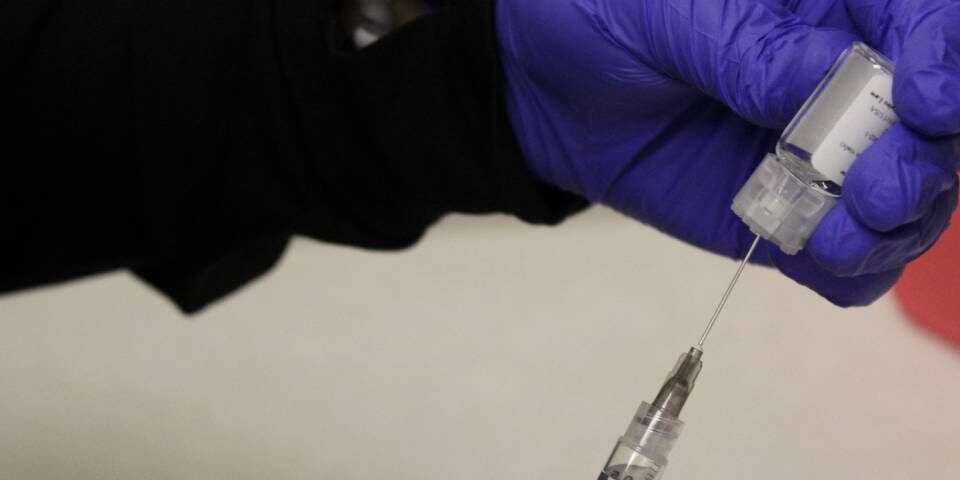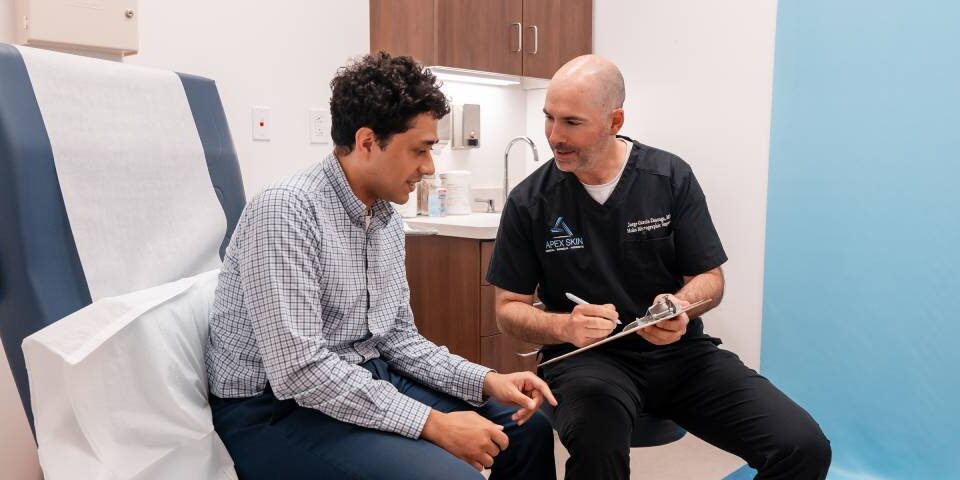
The Importance of Dermatology Clinical Trials
March 21, 2025
5 Common Misconceptions About Clinical Trials—Busted
May 12, 2025Did you know that as a fetus develops, the brain and skin develop at the same time and from the same tissues? It’s a fascinating, but little-known fact that gives rise to another more obvious fact: skin conditions are more than just uncomfortable and annoying—they can cause real psychological suffering.
As our largest and most visible organ, the skin is deeply tied to our identity, self-expression, and social and emotional well-being. Wide-ranging studies demonstrate just how skin conditions can harm mental health:
- Acne: With an 85 percent prevalence rate of acne in young people between 12 and 24 years old, studies show that acne and depression are correlated and that the connection of adolescent brain development associated with the stress and stigma surrounding acne and acne scars can worsen low self-esteem, anxiety, and dysfunctional body image.
- Eczema: Adults with eczema (atopic dermatitis) report being at least 3 times more likely to suffer anxiety and depression than people without the condition, and that number increases as the severity of the eczema increases. Children and teens with eczema also suffer a statistically significant increase in levels of anxiety and depression.
- Psoriasis: Some dermatology research suggests that the inflammation mechanisms responsible for psoriasis may be connected to chemical markers that amplify depression and anxiety, underlining the skin-brain connection further. And one in three psoriasis patients struggle with depression.
- Rosacea: 90 percent of rosacea patients in a recent survey reported low self-esteem, and more than half of them reported struggling with anxiety and a tendency to avoid social interactions because of their condition.
- Alopecia: Studies also show that alopecia patients suffer an increased prevalence and risk of anxiety and depression than people in the general population.
If you have struggled with any skin condition, chances are you don’t need skin care research statistics to prove that it hurts your mental, emotional, and social well-being. Here at Apex Clinical Research Center, our ongoing dermatology research team is actively exploring new and better treatments for several skin conditions to bring healing and hope to our patients. We understand how hard life can be for people with difficult skin conditions, so we are actively supporting our patients through dermatology clinical trials, and we invite those of you who want to participate in clinical trials to contact us to learn about how you can help blaze a path toward a better quality of life with more confidence and comfort—mentally and physically.
The Emotional Toll of Skin Conditions
Our team here at Apex Clinical Research Center has noticed that there are three different, yet deeply interrelated aspects to how skin conditions take a toll on our patients beyond just the physical discomfort of their skin conditions:
1. Self-Esteem and Body Image
Whether it is an itchy, oozy rash from eczema, acne scarring, or uncomfortable and visible psoriasis plaques, these and other skin conditions cause a visible difference between our patients and those who do not suffer from these conditions. As humans, we have this unfortunate and damaging tendency to compare ourselves to others. This can lead to our patients feeling “less than” when it comes to self-esteem and body image. Nobody should feel this way regardless, but that outward appearance piece of our self-image is hardwired into our psyche. So, when you’re struggling with a painful or visible skin condition, the resultant shame, embarrassment, and social withdrawal can feel crushing.
2. Mental Health Risks
The statistics provided earlier demonstrate that low self-esteem and poor body image consequences of skin conditions can increase risks for anxiety, depression, and mood disorders of various kinds. The psoriasis research previously mentioned is especially interesting as it indicates that inflammation associated with skin conditions and mental health are related. This is something our dermatology research team is acutely aware of.
3. Social and Professional Impacts
When you’re not feeling good about yourself, insecurity, shame, and desire to withdraw from social interaction can impede your progress in every other aspect of your life, from dating and connecting with friends to school, work, and family relationships. Even if your friends and family try to understand your struggle, you may still feel alone and less likely to reach beyond that small circle if you are embarrassed about the social stigma of your skin condition.
The Real People and Real Stress Behind the Statistics
A recent story on WHYY highlighted a mental health professional who suffers from eczema. She describes how hard it is to just live a normal life with the severity of her condition. She explains not only the mental, emotional, and social burdens associated with eczema, but also the day-to-day weight of always having to be aware, wherever she goes, of how animals, pollen, dust, carpets, scented candles, and clothing in her environment could make her condition flare up. All that stress builds up to unhealthy levels.
The Mind-Skin Connection: A Two-Way Street
Every day, as we conduct dermatology clinical trials here at Apex Clinical Research Center, we see how psychological stress can trigger or worsen skin condition flare-ups for our patients who participate in clinical trials with us. Remember how the brain and skin are connected from before we are born? Well, recent studies have pinpointed some of the mechanisms behind how psychological stress affects the skin, and, conversely, how the stress from managing skin conditions can worsen the cycle.
Inflammation that causes or worsens skin conditions is affected by hormones, many of which are stress-triggered, and these also interconnect with nervous system activity. And because the skin is also part of your immune system, there are also immune response connections. The impact of emotional dysregulation appears in a variety of skin diseases, including acne, eczema, psoriasis, skin infections, vitiligo, urticaria, alopecia, and many others. These scientifically established connections between the brain and the skin have given rise to the emerging field of Psychodermatology, which carries important clinical weight in how we conduct skincare research with our patients. Treating the emotional and mental health of our patients is just as important as addressing the presenting skin condition.
The Role of Dermatology Clinical Trials in Psychological Support
Deciding to participate in clinical trials is a powerful way to beat back the feelings of despair and hopelessness that can come from dealing with an ongoing skin condition.
More Hope Through Access to Innovative Treatments
When you’ve tried everything for an itchy skin condition that makes you uncomfortable physically and emotionally, you can start to lose hope. However, participating in dermatology research opens innovative new avenues of relief and hope for better, more effective treatments. This hope can boost your mood and confidence, which can modulate hormones and stress, which can help reduce symptoms.
Getting Involved is Empowering
If you decide to participate in clinical trials for skin care research, you can forge a path to better solutions for yourself and many other patients with similar conditions. This often restores a sense of control over your circumstances. That feeling of empowerment also amplifies the good feeling of doing something to lift and support others.
Enhanced Support and Monitoring
When you participate in dermatology clinical trials, you receive a level of detailed care and monitoring that goes above and beyond. Not only is this because clinical dermatology research must follow strict safety and quality protocols to protect patients, but it’s also part of a holistic support system that helps patients feel truly seen, supported, and heard. This gives patients an emotional boost that can also manifest in better outcomes.
The Whole-Person Care Approach
Dermatological trials often use validated tools like the Dermatology Life Quality Index (DLQI) or Skindex-16 to assess patient-reported quality of life, including mental health impacts. Our Apex Clinical Research Center dermatology clinical trials use the DLQI in nearly every clinical trial.
This isn’t all just airy-fairy stuff either: A 2022 review in Dermatology and Therapy found that clinical trial participants reported statistically significant improved quality of life and emotional well-being even before final treatment results, due to the additional structured support and engagement.
Barriers to Participation—and Why They Matter
One of the biggest, most difficult hurdles we’ve found that patients face when deciding if they want to participate in clinical trials is the psychological fear of judgment, exposure, and disappointment. These are all valid feelings that feed into the stress, anxiety, and depression reported by people suffering from skin conditions.
Our skincare research team fully understands and empathizes with these feelings, and is here to validate, support, and respect compassionate, informed decisions our patients make regarding participation. We know it’s not easy to suffer from a skin condition in the first place, and it can be a vulnerable space for patients to be open to participating in a clinical trial. This is why our research team upholds the highest standards of respect, compassion, empathy, and ethical care protocols to support our patients as they take bold steps into the world of dermatology research with us.
And there’s one more big benefit we’d like to mention: breaking the cycle of isolation. We know that a lot of people with skin diseases feel isolated and alone out there. That isolation can compound into further anxiety and depression. But stepping out and engaging with our compassionate dermatology team whose purpose and mission is to find better, more effective relief for you can help you feel less alone and more engaged in your health journey.





